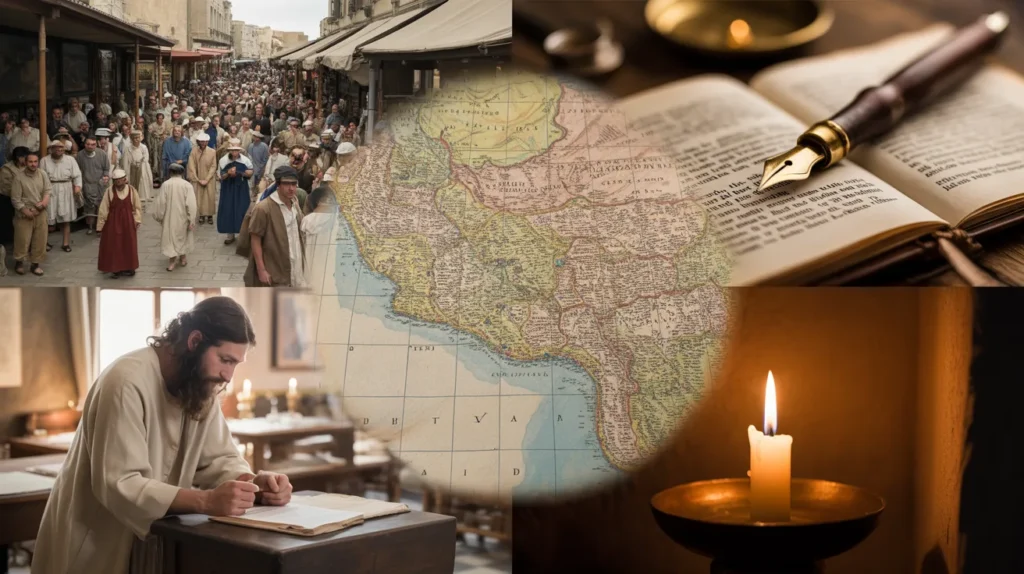Have you ever felt like life’s challenges were too heavy to carry alone? I remember sitting at my kitchen table one morning, overwhelmed by uncertainty, when a simple truth hit me: real resilience doesn’t come from gritting our teeth—it grows when we lean into something greater than ourselves.
In moments of struggle, many find comfort in timeless wisdom that reminds us we’re never truly alone. Take Psalm 18:2, for example—a powerful declaration of divine support. These words aren’t just ancient text; they’re living promises that renew our courage when fatigue or doubt creeps in.
This article isn’t about quick fixes. It’s about discovering how faith can anchor us, even when storms rage. Whether you’re facing burnout, grief, or everyday stress, the right words can light a path forward. Let’s explore how embracing grace helps us rise above life’s toughest seasons.
Key Takeaways
- Scripture offers transformative encouragement for overcoming adversity
- True resilience flows from trusting a higher purpose
- Daily reflection on faith-based wisdom builds lasting courage
- Carefully selected passages address modern struggles with timeless truth
- Spiritual strength grows through intentional connection with sacred texts
Emotional Introduction: Embracing God’s Strength in Life’s Struggles
There’s a particular ache that comes from pouring out your best and still feeling empty. Like Sarah, a young mother I met last spring, who balanced preschool drop-offs and Zoom meetings while masking her quiet desperation. “I felt like a shadow of myself,” she confessed, “until I realized isolation wasn’t my permanent address.”

History whispers countless stories of this divine rescue. Consider Ruth’s journey—a widow in foreign land—who discovered provision woven into ordinary moments. Her story mirrors what many experience today: love that rebuilds fractured hearts through simple acts of faithfulness.
Dark days lose their sting when we anchor in sacred truths. One grandmother’s journal entry from 1932 captures it perfectly:
“God’s heart beats steady when mine falters—His light splits midnight like dawn chasing shadows.”
Three practices help us lean into this grace:
- Pause morning routines to whisper gratitude for the day’s hidden gifts
- Replace self-criticism with reminders of your inherent worth in divine love
- Let ordinary moments—a child’s laugh, steam rising from coffee—become love letters from above
Your weary heart wasn’t meant to soldier through alone. What if today’s chaos became the very place you encounter peace that outlasts storms?
Bible verses for strength: Discovering God’s Promises
When the ground beneath your feet feels unstable, ancient words offer unshakable refuge. Sacred texts reveal a pattern: divine promises rise strongest when human courage falters. Consider Psalm 46:1—“God is our shelter and strength, always ready to help in times of trouble.” This declaration transforms panic into peace, reminding us chaos doesn’t get the final word.
History shows how these truths anchor souls. During the Civil Rights Movement, leaders drew courage from Joshua 1:9: “Be strong and courageous. Do not be afraid, for the Lord your God is with you wherever you go.” Such verses became shields against hatred, proving timeless truths outlive temporary trouble.
Three ways to make these promises personal:
- Write Isaiah 41:10 on your mirror: “Fear not, I am with you”
- Let Deuteronomy 31:6 silence midnight anxieties
- Use Psalm 34:17-18 as breath prayer during stressful moments
Modern chaos mirrors storms faced by generations past. Yet the same refuge that steadied them stands open today. When the world feels fractured, these living words rebuild our capacity to hope—and act.
Finding Solace in Psalm 46: God as Our Refuge
Amidst life’s storms, some words have weathered centuries to bring peace. Psalm 46 emerges from ancient Israel’s songbook, likely penned during national turmoil. Its opening lines—“God is our refuge and strength, an ever-present help in trouble”—carry weight forged in crisis.
Roots of Resilience
Scholars link this psalm to the Korahite tradition, written when earthquakes and wars shook communities. The Hebrew word māʿôz (refuge) paints God as an unassailable fortress—a truth tested through generations. One historian notes: “These words became armor for exiles and warriors alike.”
Shelter for Modern Struggles
Today’s challenges find answers in verse 2’s imagery: “Though mountains quake, we will not fear.” A nurse battling pandemic fatigue shared: “Reciting ‘The Lord is my rock’ anchors me during 16-hour shifts.”
Three ways to activate this promise:
- Visualize God’s right hand steadying you during tense meetings
- Journal how divine protection showed up in past hardships
- Whisper “Be still” (v.10) when anxiety spikes
Like rivers sustaining a city (v.4), these sacred texts refresh weary souls. Trusting the Lord God isn’t passive—it’s choosing to stand where eternal foundations hold firm.
Renew Your Spirit with Isaiah 41:10
Ever woken up with that knot in your stomach, dreading the day ahead? Isaiah 41:10 cuts through anxiety like dawn breaking over shadows: “Do not fear, for I am with you; do not be dismayed, for I am your God. I will strengthen you and help you; I will uphold you with my righteous right hand.” This isn’t vague reassurance—it’s a four-part promise addressing our deepest insecurities.
Exploring the Assurance in God’s Presence
The Hebrew word for “uphold” here (tāmak) means to grasp firmly, like a parent steadying a child learning to walk. When life shakes your confidence, this verse offers:
- Companionship that never clocks out
- Identity rooted in divine belonging
- Empowerment beyond personal capacity
- Protection that outlasts temporary storms
Personal Reflections for Overcoming Fear
Last winter, a teacher battling panic attacks started writing this passage on her classroom whiteboard. “Seeing ‘I will help you’ daily shifted my focus from worries to who’s walking with me,” she shared. Like Philippians 4:13 reminds us—“I can do all things through Christ who strengthens me”—these words transform self-doubt into holy confidence.
Try this today: Recall a moment when unexpected courage surprised you. Write “Yahweh Upholds” beside it. Let these living truths become your unshakable foundation when doubts arise.
Embracing Weakness: Insights from 2 Corinthians 12:9
What if your greatest limitations became doorways to divine empowerment? Paul’s confession in 2 Corinthians 12:9 flips society’s script on success: “My grace is sufficient for you, for my power is made perfect in weakness.” Written amid criticism from early believers, this verse reveals how struggles become sacred classrooms.
Paul’s “thorn in the flesh” (v.7) remains mysterious—chronic pain, persecution, or self-doubt. Yet its purpose crystallizes: human frailty magnifies divine intervention. BibleStudyTools notes this passage dismantles pride, showing salvation blooms not in self-sufficiency but surrendered dependence.
Consider Maria, a cancer survivor who redefined courage during chemo: “When I couldn’t lift my head, God carried my hopes. My weakness became His microphone.” Like Paul, she discovered trials aren’t roadblocks but routes to deeper trust.
Three truths emerge from this paradox:
- Difficult times aren’t punishments—they’re invitations to experience renewal
- Our “broken” things become platforms for God’s restorative work
- Salvation isn’t just future hope—it’s present-tense deliverance in daily battles
A pastor battling depression shared: “Admitting my struggle didn’t disqualify me—it let others see Christ through my cracks.” When we stop hiding imperfections, we create space for miracles. Your current struggle? It might be the very thing preparing you to witness grace in motion.
Empowerment Through Philippians 4:13
Have you ever stood at life’s edge, unsure if you could take another step? Paul’s declaration in Philippians 4:13 rings through generations like a rallying cry: “I can do all things through Christ who strengthens me.” Written from prison chains, these words became a manifesto for believers facing impossible odds—then and now.
This verse fuels modern faith movements, appearing on athletes’ wristbands and community food bank walls. Its power lies in reframing life’s battles as shared journeys rather than solo fights. As Gospel accounts show, Jesus specialized in turning “I can’t” moments into divine comebacks—feeding thousands with scraps, calming storms with a whisper.
Three ways this truth reshapes daily living:
- A single mother reciting it while balancing bills and bedtime stories
- A recovering addict clinging to it during midnight cravings
- A teacher whispering it before addressing an unruly classroom
Paul’s fortress metaphor takes concrete form here—Christ becomes our unshakable foundation when systems fail or relationships fracture. Like a friend who spots you in a marathon, His presence says: “Keep going. I’ve got your pace.”
Want to transform anxiety into action? Write this verse where doubt creeps in—your fridge, phone lock screen, steering wheel. Let it remind you that true peace isn’t the absence of chaos but the presence of power that outlasts it.
Jesus’ Promise of Peace: Lessons from John 14:27
Ever notice how chaos seems to amplify life’s volume? Amid roaring headlines and racing thoughts, Jesus’ words in John 14:27 cut through the noise: “Peace I leave with you; my peace I give you. Not as the world gives do I give to you.” Spoken hours before His crucifixion, this promise anchors us in unshakable calm when circumstances scream otherwise.
Finding Inner Peace in God’s Assurance
This verse wasn’t theoretical comfort—it was survival gear for disciples facing loss. Biblical scholars note the Greek word for peace here (eirēnē) implies wholeness, not just absence of conflict. Modern stressors mirror their fears: financial strain, health crises, relational fractures. Yet the same assurance that steadied them remains available today.
Three practices unlock this peace:
- Begin mornings with joy-focused prayer, thanking God for specific blessings
- Replace anxious “what-ifs” with journaling moments of divine faithfulness
- Let acts of service become sacred rhythms that displace fear
A social worker battling compassion fatigue shared: “Repeating ‘His peace is mine’ during hectic days helps me recenter.” Like Philippians 4:7 describes, this peace guards hearts when logic fails.
Faithful work in loving others gradually rewires our focus from earthly worries to eternal purposes. Each meal shared, kindness extended, or truth spoken becomes a brick in God’s unshakeable kingdom—and a step toward lasting joy.
Want to test this promise? Write John 14:27 where panic strikes—your phone background, car dashboard, or office monitor. Let its truth transform turmoil into quiet confidence.
Overcoming Anxiety with Deuteronomy 31:8
How often do we face crossroads where fear whispers lies of abandonment? Moses addressed this human struggle as Israel stood on wilderness’s edge: “The Lord Himself goes before you. He will never leave you nor forsake you. Do not be afraid.” These words still dismantle anxiety’s grip today.
Deuteronomy 31:8 anchors us in two unshakable truths. First, divine presence isn’t conditional—it’s a permanent covenant. Second, God’s “going before” means He’s already securing paths we’ve yet to walk. Like the Israelites fleeing Egypt, we’re called to trust the hand that parts seas and silences armies.
Modern anxieties mirror ancient fears. A business owner facing bankruptcy shared: “Remembering God’s faithfulness during Israel’s exodus stopped my panic spiral.” Three practices help activate this promise:
- Start mornings declaring “You’re with me” aloud
- Journal moments when divine timing surpassed human plans
- Share burdens with faith communities—earthly reminders of eternal support
While earthly systems crumble and clocks tick relentlessly, God’s hand holds both time and eternity. Our temporary struggles become classrooms where we learn to lean on everlasting arms. What if today’s uncertainty became your invitation to discover companionship that outlasts every storm?
Celebrating God’s Strength: Exodus 15:2 and Psalm 18:2
What does victory sound like after decades of waiting? Exodus 15:2 erupts with Moses’ song after the Red Sea deliverance: “The Lord is my strength and defense; He has become my salvation.” This triumphant declaration birthed hope for generations facing impossible odds.
Scriptural Context and Historical Background
Moses penned these words after witnessing Pharaoh’s army drown—a defining moment for Israel’s identity. Similarly, Psalm 18:2 emerged from David’s wilderness years: “The Lord is my rock, my fortress and my deliverer.” Both passages use military imagery to declare God’s strategic help in tangible battles.
Archaeologists note these texts became survival anthems during:
- Babylonian exile
- Roman occupation
- Early church persecutions
Encouraging Daily Faith and Endurance
The righteous right hand metaphor symbolizes God’s active intervention. Just as He parted seas for Moses and shielded David from spears, this imagery assures us of divine partnership today. A firefighter battling California wildfires shared: “Reciting ‘my stronghold’ during 3 AM shifts reminds me I’m not alone.”
Three ways to live these truths:
- Start mornings declaring Exodus 15:2 as your victory anthem
- Visualize God’s right hand guiding tough decisions
- Journal moments when divine help surprised you
Like ancient warriors, we’re called to march forward—not because storms vanish, but because the One who upholds the righteous walks beside us. Let these living words reshape how you face today’s battles.
Building Endurance: Wisdom from Romans 5:3-5
Challenges often feel like fire—uncomfortable, unpredictable, yet strangely transformative. Romans 5:3-5 unveils this paradox: “Suffering produces endurance, endurance produces character, and character produces hope.” This progression reveals how struggles become divine tools shaping hearts for greater purposes.
Endurance grows through repeated trials, much like muscles strengthen under resistance. A teacher battling classroom burnout shared: “Each tough semester taught me to lean into God’s strength, not my fading energy.” The Greek word for character (dokimē) implies proven authenticity—qualities forged through pressure, not theory.
This scripture invites us to reframe hardships as apprenticeships in hope. Consider:
- Financial strain revealing God’s provision in creative ways
- Health crises deepening reliance on divine love
- Relational fractures teaching grace-filled resilience
Paul’s message anchors hope in Jesus Christ, whose resurrection power turns brokenness into breakthroughs. As theologian N.T. Wright notes: “Christian hope isn’t wishful thinking—it’s trust in the God who renews all things.”
Your current struggle? It might be the very furnace refining your heart’s capacity to love and lead. What if today’s trial became tomorrow’s testimony of god strength heart made whole through holy perseverance?
Strength in Community: Comfort in 2 Corinthians 1:3-4
What if the weight we carry could lighten someone else’s load? Paul’s words in 2 Corinthians 1:3-4 reveal a beautiful truth: “The Father of compassion comforts us in all our troubles, so we can comfort others.” This divine exchange transforms personal pain into communal healing.
Early Christians embodied this during Roman persecutions, sharing resources and hope in underground gatherings. Their actions mirrored scripture’s call—the Lord Rock becomes visible when believers stand together. A modern example? After Hurricane Katrina, churches nationwide mobilized, proving shared faith gives strength to rebuild shattered lives.
Sharing God’s Comfort with Others
Mutual encouragement thrives when we:
- Start prayer chains for neighbors facing job loss
- Deliver meals with notes affirming God’s faithfulness
- Share personal stories of how grace carried us
Consider Marta, a widow who began hosting weekly coffee hours after losing her husband. “Listening to others’ struggles reminded me I’m not alone,” she shared. Renew strength flows when we both give and receive support.
Your local community needs your unique gifts. Text a friend today: “Let’s walk this out together.” When we lean on the Lord Rock and each other, burdens become bridges to deeper connection.
Soaring on New Wings: Inspiration from Isaiah 40:31
Have you ever watched an eagle catch a thermal current, rising effortlessly when winds rage below? Isaiah 40:31 paints this vivid truth: “Those who hope in the Lord will renew their strength. They will soar on wings like eagles.” This promise isn’t about escaping storms—it’s about finding god love that lifts us above life’s turbulence.
Eagles don’t flap harder to ascend—they stretch their wings and trust unseen currents. Similarly, waiting on divine timing becomes our spiritual updraft. A teacher battling chronic fatigue shared: “Reciting this verse daily shifted my focus from exhaustion to expectancy. I began noticing small mercies—like energy for afternoon lessons I didn’t have before.”
The Hebrew word qāwâ (wait) implies tension, like a rope being stretched. This active trust aligns our hearts with righteous right purposes. Pursuing holiness isn’t about perfection—it’s positioning ourselves to receive heaven’s momentum.
Three practices help activate this promise:
- Morning affirmations: “Today, I rise above fear through God’s enduring love”
- Visualizing challenges as wind currents lifting you higher
- Journaling moments when divine support upheld righteous steps
Your current struggle might be the very gust preparing you to soar. When we anchor in god love rather than fleeting feelings, ordinary faithfulness becomes extraordinary flight. Let Isaiah’s vision redefine how you see today’s storms—not as obstacles, but as invitations to rise on righteous right wings.
Divine Intercession: Understanding Romans 8:26-27
When words fail and worries pile up like unopened letters, Romans 8:26-27 reveals a profound comfort—our sighs become sacred conversations. The passage assures believers that god strength meets us precisely where human language falters, transforming groans into divine dialogue.
How the Holy Spirit Prays on Our Behalf
Paul describes the Spirit’s work as a sacred translator, interpreting our deepest needs to the Father. Biblical scholars note the Greek term hyperentynchanō means “to intercede with intensity”—a reminder that no tear escapes divine notice. Like a parent deciphering a child’s wordless cries, God decodes our fragmented emotions into perfect petitions.
Consider a caregiver battling burnout, too exhausted to form coherent prayers. Romans 8 insists their weariness becomes holy data points for the Spirit’s intervention. Theologian N.T. Wright observes: “Heaven hears what our strength heart cannot articulate—every ache mapped by grace.”
Three truths anchor this promise:
- Silence isn’t spiritual failure—it’s an invitation for divine partnership
- Confusion becomes clarity through the Spirit’s perfect understanding
- No season of doubt can leave forsake us outside God’s care
A nurse navigating pandemic trauma shared: “Knowing my midnight anxieties weren’t ignored—just entrusted to heaven’s translator—changed everything.” Your unspoken struggles? They’re already being turned into answered prayers by the One who holds both your strength heart and tomorrow’s dawn.
Trusting in God’s Shelter: Lessons from Proverbs 18:10
Shelter isn’t just physical—it’s the invisible refuge we crave when storms rage within. Proverbs 18:10 declares: “The name of the Lord is a strong tower; the righteous run to it and are safe.” Ancient Jewish scholars viewed God’s name as representing His unchanging character—a fortress built on faithfulness rather than fleeting circumstances.
The phrase “horn of salvation” (Luke 1:69) connects to this imagery, symbolizing power and protection. In biblical times, a horn represented strength—like a ram’s defense against predators. Today, this metaphor reassures people facing modern threats: layoffs, health scares, or fractured relationships.
Consider a community in tornado alley who painted Proverbs 18:10 on their storm shelter walls. “When sirens blare, we’re reminded our true safety isn’t underground,” shared their pastor. Flesh and heart find rest here—not just bodies escaping danger, but spirits anchoring in divine promises.
Three ways to experience this shelter daily:
- Whisper God’s names (Jehovah Jireh, El Roi) during anxious moments
- Visualize His horn of salvation shielding your vulnerabilities
- Join others in prayer circles, embodying refuge for weary people
Historical records show early Christians etched this verse on catacomb walls. Their courage whispers across centuries: the same shelter that steadied them stands open. Whether you’re a single parent juggling deadlines or a nurse facing burnout—your trembling flesh and heart have a safe harbor. Run there. Rest there. Rise there.
Daily Reminders: Meditating on God’s Love and Grace
Morning routines often feel rushed, but what if they held space for sacred connection? Modern devotional practices reveal a pattern: consistent encounters with spiritual truth reshape how we experience ordinary moments. Like sunlight filtering through blinds, daily reflection illuminates hope in life’s corners we often overlook.
Sacred Rhythms for Modern Lives
Start small—five minutes while coffee breaks. A nurse I know uses infusion pump beeps as prompts to whisper “Your love sustains me” (Psalm 13:5). This micro-habit became her lifeline during chaotic shifts. Studies show brief, frequent spiritual practices boost emotional resilience more than occasional deep dives.
Three simple methods integrate sacred truth:
- Write the Lord’s promises on sticky notes—mirror, dashboard, laptop
- Pair routine tasks (laundry folding, commutes) with audio scripture
- Use meal prep time to recall specific ways God provided that day
These practices transform mundane moments into comfort-filled encounters. A teacher shared: “Reviewing ‘I am with you’ texts between classes anchors my anxious mind.” Over time, these fragments weave a tapestry of trust—proof of divine presence in life’s fabric.
Consistency matters more than duration. Whether through journaling one line or pausing to breathe a prayer, daily engagement with sacred texts renews hope from the inside out. Let today be your starting point—a single step toward making eternal truth your most constant companion.
Conclusion
When the noise of the world fades, enduring truths rise to meet our deepest needs. Each passage we’ve explored—from sheltering refuge in Psalms to eagle-winged renewal in Isaiah—offers more than momentary relief. These living words form a spiritual compass, guiding us toward unshakable hope even when paths grow steep.
Daily engagement with sacred texts builds resilience like roots anchoring a mighty oak. Whether scribbling promises on sticky notes or sharing encouragement with neighbors, small acts of faith reshape how we weather storms. The same divine rock that steadied Moses and David remains our permanent shelter today.
Let this journey spark fresh commitment to spiritual rhythms. Start tomorrow with five minutes of gratitude. Text a friend one line that lifted your spirit. Every choice to lean into eternal truth strengthens your capacity to love boldly and serve generously.
Our greatest peace comes not from calm circumstances, but from knowing who holds the storm. Walk forward assured: you’re standing on foundations no earthly tremor can shake.
FAQ
How can scripture help me face daily challenges?
Passages like Philippians 4:13 remind believers that divine empowerment transcends human limitations, offering courage and resilience in adversity. Trusting these truths fosters spiritual and emotional fortitude.
What does it mean for God to be our “refuge”?
Psalm 46 describes the Lord as a shelter amid chaos. This metaphor emphasizes His unwavering protection and peace, even when earthly circumstances feel overwhelming or unstable.
How do I overcome fear using Isaiah 41:10?
The verse reassures that God’s presence eliminates the need for fear. By focusing on His promise to uphold us, we replace anxiety with faith in His sovereign care and strength.
Why is weakness highlighted in 2 Corinthians 12:9?
Paul’s teaching reveals that human frailty magnifies divine power. When we acknowledge our limitations, Christ’s grace becomes the foundation for enduring trials and thriving spiritually.
Can Deuteronomy 31:8 address modern anxiety?
Absolutely. The passage underscores God’s faithfulness to guide and sustain His people. Meditating on His nearness shifts focus from temporary struggles to eternal hope.
How does community strengthen faith during hardships?
2 Corinthians 1:3-4 encourages believers to share comfort received from the Lord. Mutual support within a faith community fosters unity and reinforces trust in His promises.
What role does the Holy Spirit play in difficult times?
Romans 8:26-27 explains that the Spirit intercedes when words fail us. This divine assistance aligns our prayers with God’s will, deepening reliance on His wisdom and timing.
How can Proverbs 18:10 inspire confidence today?
The verse portrays the Lord as an unshakable stronghold. Trusting His protection cultivates boldness, knowing His righteousness shields us from life’s spiritual and emotional battles.
What practical steps help apply these verses daily?
Start with prayerful meditation on key passages like Isaiah 40:31. Journaling reflections and sharing insights with others anchors truth in real-life struggles, renewing hope continually.



